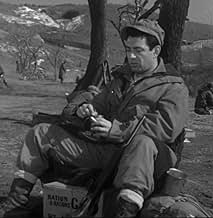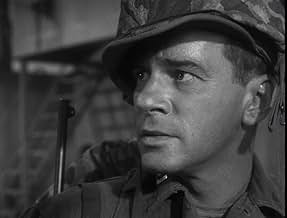Ajouter une intrigue dans votre langueThe saga of a battalion of U.S. Marines during the Korean War, starting with their training, landing at Inchon in 1950, advance into North Korea and their subsequent retreat back to the 38th... Tout lireThe saga of a battalion of U.S. Marines during the Korean War, starting with their training, landing at Inchon in 1950, advance into North Korea and their subsequent retreat back to the 38th parallel.The saga of a battalion of U.S. Marines during the Korean War, starting with their training, landing at Inchon in 1950, advance into North Korea and their subsequent retreat back to the 38th parallel.
- Réalisation
- Scénario
- Casting principal
- Jimmy W. McDermid
- (as Rusty Tamblyn)
- Sgt. Novak
- (as Ned Young)
- Capt. Kyser
- (as Mort Thompson)
- Radio Operator
- (non crédité)
- Boxum
- (non crédité)
- Child
- (non crédité)
- Doctor
- (non crédité)
- Marine
- (non crédité)
Avis à la une
Film's set during the Korean War are few and far between, it's almost as if it's an overlooked cinema topic in many ways. Pork Chop Hill and MASH aside, you would be hard pressed to name half a dozen films set in and around what has become the forgotten war. Now Retreat, Hell! is nothing to greatly shout about, and certainly it isn't fit to lace up the shiny boots of Gregory Peck's pork chop sizzler (sorry for that). It's however one of those films that you can stumble on with no expectation and enjoy purely on an interesting scale. Riddled with clichés and serving only to achieve its aim of bravado flag waving heroics, it carries a little emotional weight (soldiers insecurities and fears) and molds nicely the mounting tension (the wait for attack is itchy) with its competently handled gun fire. Directed by Joseph H. Lewis (7th Cavalry & The Big Combo) and starring Frank Lovejoy (In a Lonely Place & House of Wax) Richard Carlson (The Ghost Breakers & King Solomon's Mines) and a young and bouncy Russ Tamblyn (Tom Thumb & West Side Story). Retreat, Hell! wont have you hankering for another visit some time in the future, but hopefully, just like me, you will be glad that you at least gave it the time of day. 6/10
It's just that it has a...sensitive side. It somehow seems out of place for its time, more suited for the 70's than the '50s.
Richard Carlson is an unlikely hero for a war picture, particularly one from the hard-edged, patriotic 1950's. He's such a sensitive, nice fellow, and, to those of us accustomed to seeing him portray science-nerds (as in `Creature from the Black Lagoon' and `It Came from Outer Space') he may seem a tad intellectual for a leader of a Marine company. Even more unlikely is baby-faced Russ Tamblyn (who was still billing himself as `Rusty' at the time) as a rough-necked Marine Corps grunt. But that's the kind of picture this was: a war movie that dealt with the human face of war, even to the point of making `our boys' seem downright sentimental, but without being even remotely a vehicle for pacifist sentiments. It's an unusual, even eccentric approach, and at times it doesn't work, while at others it surprises with effectiveness.
There aren't very many war movies about Korea, today called `the forgotten war' in America. The most well-known one, `MASH,' was an unabashed allegory for Vietnam, and one quickly loses sight of the distinctions. `Retreat Hell' is much more specific, and accurate, in its portrayal of a war most Americans don't really know what to make of. It was the war we didn't quite lose, but certainly didn't win, and for the post-WWII generation, that was a perplexing legacy. Many of the more extreme patriots of the day chose to rationalize it by asserting we had been railroaded into the war by the UN, possibly as part of a Communist conspiracy. `Retreat Hell' avoids political uncertainties by focusing on the lives of brave but sympathetic soldiers, who did their duty as the American leadership saw fit to define it.
The title, which sounds like a statement of defiance (`like Hell we'll retreat') is actually a somber quotation from General MacArthur. At the time the forces in Korea had overextended themselves, and become surrounded on all sides. The order was given to break through the enemy lines to the sea. When asked about the retreat in Korea, the general replied `Retreat Hell, we're advancing in the other direction.' A retreat normally means falling back through your own lines to reach a stronger position, but this was an advance, through enemy lines, to a position that would allow a retreat.
Unlike many WWII pictures that were being made at the time, actual Asian actors were used to portray Asians, and not all of them were evil. The filmmakers evidently thought enough of their audience to remind them that the war was being fought for our Asian allies, not as a racist war against a generic enemy. In light of recent political developments, it is interesting to note that the British also make an appearance on our side. The Communist soldiers are portrayed as devious and callous, but not beyond the realities of the war (obviously Bad Things committed by our side are not shown) - they are not inhuman, merely the enemy.
This movie gives us both action and drama, and probably was a precursor to `Saving Private Ryan' in more ways than one.
The film does what too many war films do...uses too much stock footage that is scratchy and clearly NOT made for the movie in the first place. Aside from this, the story is reasonably well done, though most of the characters are a bit one-dimensional. Not a bad overview of this period, though.
Le saviez-vous
- AnecdotesWhen asked if they were retreating, Frank Lovejoy's character, Lt. Col Steve Corbett, says, "Retreat, hell! We're not retreating, we're just advancing in a different direction." This was actually said by Maj. Gen. O.P. Smith, who was Commanding General of the 1st Marine Division at the Battle of Chosin Reservoir.
- GaffesAfter Captain Hansen interviews Private McDermid at Camp Pendleton, he tells him to put his cap on. Marines do not use the term 'cap'. The correct term is 'cover'.
- Citations
Lt. Col. Steve L. Corbett: Retreat hell! We're not retreating, we're just advancing in a different direction.
Meilleurs choix
Détails
- Durée1 heure 35 minutes
- Couleur
- Rapport de forme
- 1.37 : 1
Contribuer à cette page




























